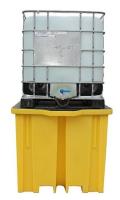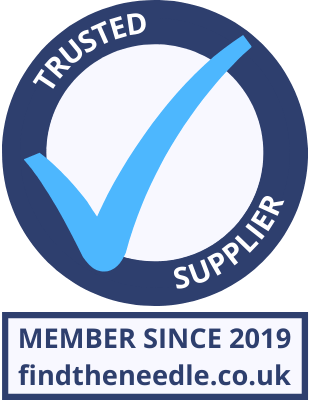 Add My Company
Add My Company
Sign In
What Is an IBC bund?
18-05-2022

What Is an IBC bund?
An IBC bund is designed to be placed directly beneath an IBC (intermediate bulk container), in order to catch and contain any spills.
An IBC bund helps to prevent cross-contamination and avoid potentially dangerous chemical reactions in the event of an accident. Most importantly, an IBC bund helps to keep storage areas safe and spill-free.
If your company stores liquids in IBCs, an IBC bund is an essential health and safety measure. In this article, the team at ITP Packaging explains exactly what an IBC bund is and when you might need one.
What Is an IBC Bund?
An IBC bund is a specific type of spill pallet that’s intended to be used in conjunction with an IBC. An IBC is a large, often rigid container used to store industrial quantities of liquids in industrial environments.
An IBC bund sits beneath an IBC, providing a ‘sump’ space that can fill with liquid in the event that the IBC is compromised, damaged or broken. The sump space is effectively a way to contain any spilt liquid, preventing it from spilling onto the floor.
As such, an IBC bund is large enough to hold 110% of the quantity of liquid present in the IBC, which will commonly have a capacity of 1,000 litres. Because IBCs can be used to hold everything from drinking water to hazardous chemicals, an IBC bund is made from a non-reactive and robust material such as polyethylene.
When Would You Need an IBC Bund?
An IBC bund is an essential feature of industrial workplaces, particularly if you want to minimise the chance of accidents and contamination occurring. They are especially necessary if your business stores or transports potentially dangerous, flammable or hazardous liquids in IBCs.
As they are designed to contain industrial spills, there are a number of scenarios when you might require an IBC bund:
To prevent workplace spills
To stay health and safety compliant
To protect workers from dangerous chemicals or solvents
To contain hazardous spills in the event of an accident
To avoid contamination in storage or transport areas
To prevent costly clean-ups
If you’re transporting hazardous liquids in an IBC, we highly recommend using an IBC bund to protect your workers, prevent accidents and contain dangerous spills. In certain situations, you may even be required by law to use an IBC bund in conjunction with an IBC.
In other situations, when the goods you are storing are not hazardous (such as drinking water), it’s often still recommended to use an IBC bund. The bund will stop water (and other liquids) from becoming hazards once spilt, and the bund will save you from having to organise costly or time-consuming clean-up operations.
What Are the Different Types of IBC Bunds?
There are several different types of IBC bund on the market. Before purchasing you’ll need to consider which is best suited for your industrial needs.
The main distinctions between IBC bunds are:
Materials: IBC bunds are often made of either plastic (polyethylene) or steel.
Capacity: IBC bunds are designed to hold different quantities of liquid, based on the size of the IBC.
Design: IBC bunds may or may not be designed with four-way access for forklifts, or with other similar industrial specifications.
It should be noted that IBC bunds can be made to spec, and with variable attachments and designs that allow them to meet specific industrial requirements.
Which Industries Commonly Use IBC Bunds?
A large cross-section of industries commonly use IBC bunds on a regular basis. In fact, for any industry that needs to store or transport liquids in an IBC, IBC bunds are essential.
This means they are found in industries as wide-ranging as gardening, events and pharmaceutical supplies. You can find IBC bunds in warehouses, in storage areas, at festivals, on construction sites, and much more.
They are incredibly versatile. Examples of common industries that use IBC bunds include:
Automobile
Aviation
Construction
Catering
Medical
Pharmaceuticals
How Durable Is an IBC bund?
IBC bunds are manufactured from hardwearing, non-reactive materials, and they’re designed to meet strict regulatory guidelines. As such, they are incredibly durable pieces of industrial equipment.
An IBC bund, if properly stored and regularly inspected, can be expected to have a long lifespan stretching years and possibly decades. They can be reused time and time again (as long as there is no cross-contamination) and they are able to withstand industrial conditions, including movement via forklift and long periods of storage and transport.
What Problems Can a Damaged IBC Bund cause?
While an IBC bund is designed to be robust and hardwearing, they are not unbreakable. Consequently, they should always be checked regularly for any damage or corrosion. This is important, because if the IBC bund is damaged, this can make it ineffective at containing spills or leaks. Essentially, a damaged IBC bund can no longer perform its job.
Damage can lead to spills or leaks seeping out through cracks or breaks in the IBC bund, which in turn can cause contamination, cause water to pool in storage or transport areas, and even cause accidents or health and safety incidents.
Why Choose ITP Packaging’s IBC Bunds?
ITP Packaging offers a range of IBC bunds and IBC-compatible spill pallets designed for industrial use. Here are some reasons for choosing our high-quality IBC bunds to meet your industrial requirements:
IBC bunds are manufactured from robust, chemical compatible polyethylene
IBC bunds have removal plastic grids that allow for an easy clean-up
IBC bunds are forklift compatible
In addition, ITP Packaging provides a range of IBC bund covers, as well as a comprehensive selection of other industrial packaging goods. Our products are designed to meet rigid government regulations and UN standards, and our experienced team are happy to answer any questions you may have.
For more information on What Is an IBC bund? talk to ITP Packaging Ltd
Enquire Now
List your company on FindTheNeedle.

